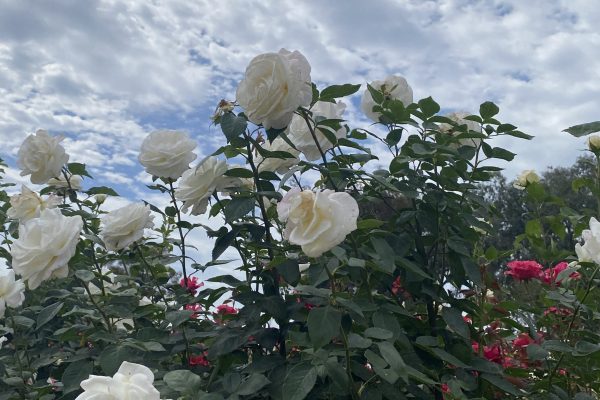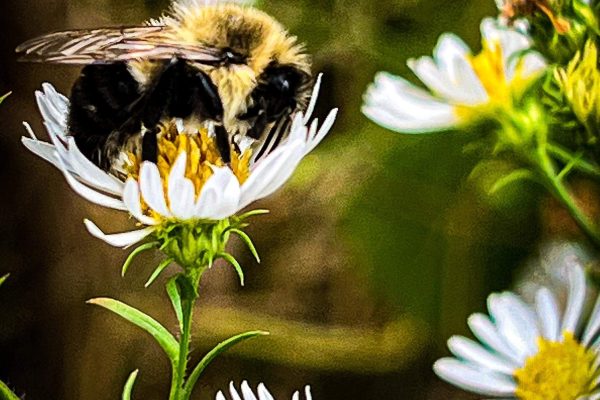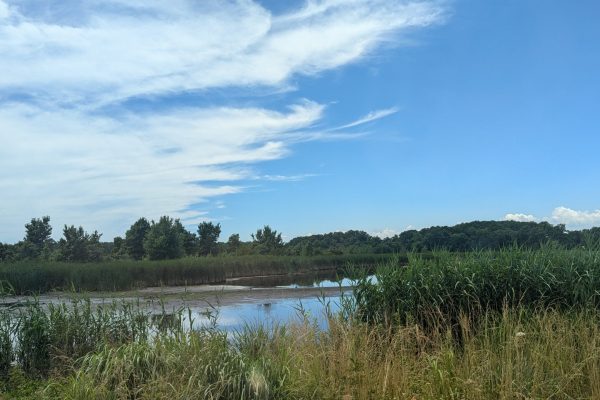אֻשְׁפִּיזִין הַזְמָנָה לְאִמּוֹתֵינוּ בָּסֻּכָּה
Transliteration:
Ushpizin hazmanah l’imoteynu basukkah.
In the Kabbalistic custom of the Ushpizin, seven of our fathers are invited to join us in our sukkah. Just as our mothers are not invited to the sukkah in the Ushpizin, we, today, are not wholly invited to the synagogue and to the centers of Jewish community. In many places we can participate with men, but we cannot speak our most profound spiritual truths. And if we are invited on condition of our silence, we do not enter as whole people.
This Sukkot, we invite seven of our mothers to join us in our sukkah to share their wisdom and power.
English:
We invite to our meal the honored guests:
Sarah, Rivkah, Leah, Rachel, Dinah, Miriam, and Ruth.
נְזַמֵּר לִסְעֻדָתֵינוּ אוֹרְחוֹת נִכְבָּדוֹת
שָׂרָה רִבְקָה לֵאָה רָחֵל דִּינָה מִרְיָם וְרוּת
Transliteration:
N’zamer lisudateynu orkhot nikhbadot.
Sarah Rivkah Leah Rakhel Dina Miryam v’Rut.
English:
Sit, sit, honored guests.
שְׁבוּ, שְׁבוּ אוֹרְחוֹת נִכְבָּדוֹת
Transliteration:
Shuvu, Shuvu orkhot nikhbadot.
English:
Sit, sit, wise guests.
שְׁבוּ, שְׁבוּ אוֹרְחוֹת פִּקְחוֹת
Transliteration:
Shuvu, shuvu orkhot pikkhot.
English:
Sit, sit, absent guests for whom we have waited.
שְׁבוּ, שְׁבוּ אוֹרְחוֹת חֲסֵרוֹת שֶׁחִכִּינוּ לָהֶן
Transliteration:
Shuvu, shuvu orkhot khaseyrot shekhikinu lahen.
English:
Sit, sit. The meal has been prepared already – this time you do not have to cook or serve.
שְׁבוּ, שְׁבוּ הַסְעֻדָה כְּבָר מוּכָנָה הַפָּעַם הַזֹּאת אֵין עֲלֵיכֶן לְבַשֵּׁל אוֹ לְהַגִּישׁ
Transliteration:
Shuvu, shuvu hasudah k’var mukhanah hapa’am hazot eyn aleykhen l’vashel o’ l’hagish.
Sarah, our mother, infertile until God remembered you, we invite you. Teach us to welcome mothers, women without children, women blessed in years, women with unique bodies, and women with disabilities.
Rivkah, our mother, who inquired of God and knew the future, we invite you. Teach us to welcome women who use their power in ways we might not yet understand.
Leah, our mother, despised by your husband, recipient of your sister’s jealousy, we invite you. Teach us to welcome women in their own right and not in the order of their preference by men.
Rachel, our mother, who waited for fourteen years for love because of your father, we invited you. Teach us to welcome women not yet in power over their own lives, not to judge their choices but to give them strength.
Dinah, our mother, pared by a stranger and silenced by your male relatives, we invite you. Teach us to welcome women who are survivors of sexual assault.
Miriam, our mother, stricken with leprosy after you questioned Moses’ exclusive relationship with God, we invite you. Teach us to welcome women with spiritual leadership. Lead us, prophet, in the song to God that is not yet sung. Praise Her with your voice and your body.
Ruth, our mother, who chose a Jewish women’s path and her God, we invite you. Teach us to honor women who choose Judaism, women who love women, lesbian women, and bisexual women.
English:
May it be your will, Source of Wholeness, our God and the God of our mother and fathers, to sprad over us a sukkah of peace, and just as this year we invited our mothers and ourselves to our sukkah, that we will sit next year in a whole sukkah, to which all of Am Yisrael is invited, quickly in our lifetime, Amen, Selah. Next year in a whole Jerusalem.
יְהִי רָצוֹן מִלְּפָנֶיךָ מְקוֹר הַשְּׁלֵמוּת, אֱלֹהֵינוּ וְאֱלוֹהֵי אִמּוֹתֵינוּ וַאֲבוֹתֵינוּ, שֶׁתִּפְרֹשׁ עָלֵינוּ סֻכַּת שָׁלוֹם, וּכְשֵׁם שֶׁהִזְמָנוּ אֶת אִמּוֹתֵינוּ וְאֶת עַצְמֵנוּ לְסוּכַּתֵנוּ, כֵּן נֵשֵׁב בַּשָּׁנָה הַבָּאָה בְּסֻכָּה שְׁלֵמָה אֵלֶיהָ מֻזְמָן כֹּל עַם יִשְׂרָאֵל, בִּמְהֵרָה בְּיָמֵינוּ, אָמֵן סֶלָה. לְשָׁנָה הַבָּאָה בִּירוּשָׁלַיִם הַשְּׁלֵמָה
Transliteration:
Y’hi ratzon milfaneykha m’kor hashleymut, eloheynu v’elohey imoteynu va’avoteynu, sh’tifrosh aleynu sukat shalom, u’khshem she’hizmanu et imoteynu v’et atzmeynu l’sukateynu, keyn neshev bashanah haba’ah b’sukah sh’leymah eyleyha moozman kol am Yisrael, bimheyrah b’yameynu, amen selah. L’shanah haba’ah birushalayim hashleymah.











